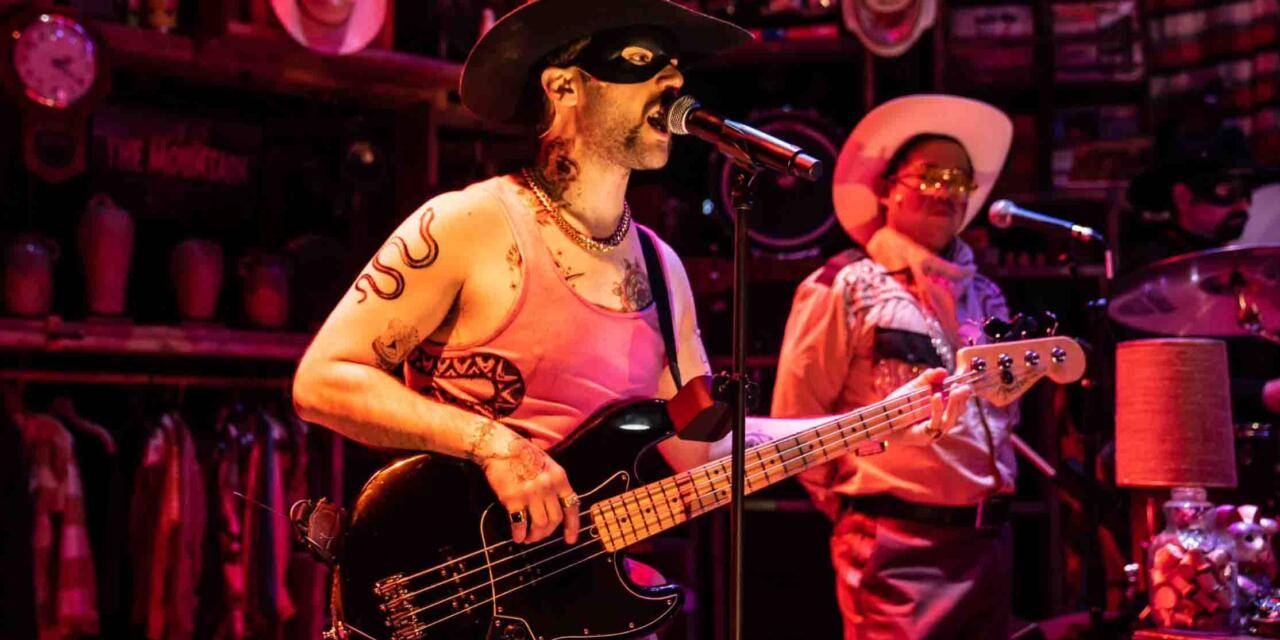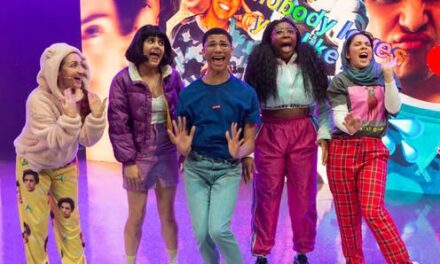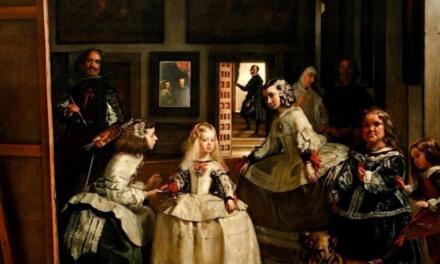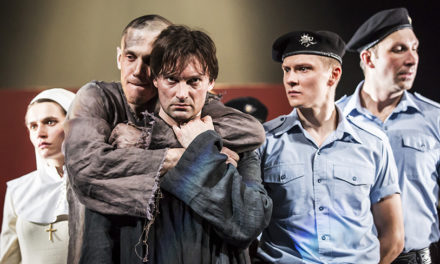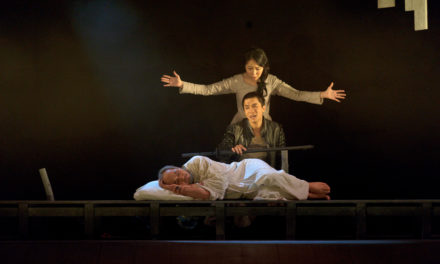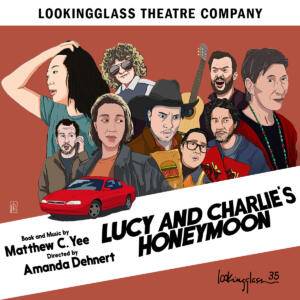
Poster of Lucy and Charlie’s Honeymoon. Photo Credit: Lookingglass Theatre. Dir. Amanda Dehnert. (2023).
A personal interview with the visionary and multi-talented Matthew C. Yee reveals exclusive insights into his musical Lucy and Charlie’s Honeymoon, directed by Amanda Dehnert and currently premiering in Chicago’s Lookingglass Theatre. Direct from his Broadway debut Almost Famous, Matthew C.Yee strikes the audience again with his originality in composing the entire narrative and music of Lucy and Charlie’s Honeymoon, while starring and playing instruments—all of it with the utmost brilliance. The play features Lucy and Charlie, a “First Generation Asian-American Renegade” couple. On the run after their novice robbery of a gas station, they save a sex trafficking victim Bao fresh off the plane from China, setting off a series of events that bring wonder, laughter, and tears. In our interview, Matthew shares his intention, creative process and ultimate vision for this play. He ponders the struggles of the Asian American community and the play’s appreciation for the innate complexity of the Asian American identity, as well as that of each human being. Matthew is perhaps more aware and reflexive than most people realize. His extraordinary talent, which allows him to move seamlessly between artistic mediums of playwriting, songwriting, acting, singing and filmmaking, stems out of his innate drive to “make things” and, in the process, to persevere and problem-solve —to Matthew, creativity is all about turning the impossible into the possible. This in-depth interview is not to be missed, in addition to Matthew C. Yee’s not-to-be-missed musical!
Susanna Sun: So first of all, congratulations on a very brilliant show! I really enjoyed it. It’s one of those shows that really kept my attention engaged.
Matthew C. Yee: Totally. Yeah. I get that. That was definitely something I was aiming for in writing. It was like, I wanted it to be entertaining in every single moment, you know? Even in the parts where we have to get exposition done and set up the story, I always wanted it to be fun, you know?
Susanna: Yeah. Do you tend to try to weave in a lot of tension or suspense in your stories?
Matthew: Yeah, definitely. I love combining genres like comedy, and romance with thriller and horror; sometimes it is a lot of fun for me.
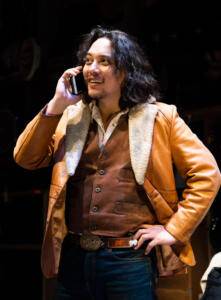
Matthew C. Yee as Charlie Chan in Lucy and Charlie’s Honeymoon. PC. Lookingglass Theatre. 2023.
Susanna: Actually, I’ve been thinking about this because of the concept of renegade that you latch onto, it naturally spurs a lot of narrative tension.
Matthew: Yeah, totally. Like the sort of trope of the outlaw lover story, right? It’s an iconic American storytelling mechanism that we’re able to put through a new lens.
Susanna: So do you want to talk a bit about how you came up with the theme?
Matthew: Sure. It started when I was in college and was taking an on-camera class and they asked us to find a scene that we wanted to film with a camera crew. And I wasn’t finding anything that I wanted to do that was like, from a movie. So I started writing this scene about this couple that is about to rob a gas station. The whole scene is them arguing about how they’re going to rob the gas station and the scene ends with them never really figuring it out. It was a short to medium scene and we filmed it. But afterward I sort of put it away for years until there was an event at Victory Gardens [a Chicago t ]. I took that short scene and expanded it into something larger and was really interested in making it about the Asian American experience. So it took off from there. And after that Victory Gardens thing, it turned into a full-life musical, well actually it was more of a play for a while, but then more and more songs started getting added to it and I just liked the direction it was going and so I kept working at it.
Susanna: That’s great. I saw that you did the Moscow program previously. I actually got accepted and was going to attend it. I heard it was really intense.
Matthew: I really enjoyed it. It was one of my favorite of all of my educational experiences. It was cool to go where modern acting began and where the modern play sort of began too. We were studying in the same halls as Chekhov and Stanislavski. But it was also very intense when we were working. Hours were like nine to six every day, or nine to eight some days.
Susanna: Very intense. When I was watching your show, I could tell that your acting style felt more like on-camera acting compared to other people. That’s one of my most prominent impressions.
Matthew: Yeah, I do on-camera acting. That’s a bigger part of my career, I was doing TV stuff, like small guest star stuff. I love that. I mean the show can be over-the-top sometimes, but in a lot of ways there are a lot of really big acting moments, so where I can find places to be a little more subtle, I try and try and make that work. You know? The big challenge with doing a show like this, you wanna combine that with realistic character choices and realistic characters who are acting naturally. So that was the ultimate goal throughout, especially with Amanda Dehnert, the director, the show may be insane but let our performances stay grounded in some sort of reality.
Susanna: I really appreciated your acting. I saw from some of your other interviews that you imagined this story at first as a film story. So taking into account medium-specificities, I wonder how imagining this story primarily as a film in the first place, shape the theatrical production of Lucy and Charlie?
Matthew: Totally. I am multidisciplinary. I do a lot of different stuff and I always love to find ways to combine those things. Even the genre of the show— it’s a comedy, but it’s a thriller, and yet it’s also a drama. It’s all this stuff and it’s kind of horrific. I was always imagining it as a film. Knowing that when we got to the point where it was going to be produced as a theater piece, we were going to have a ton of really weird challenges to overcome. We have the sort of ambitiousness of the script and we have the limitations of theater. And when you try and combine those things, you come up with really interesting solutions that you never would have thought of before. So one of my favorite things to do as an artist is to put limitations on myself and then find a way to be creative and be successful, whatever that means within the limitations. So when you take, like, a chase scene and you try and put it on the stage, it’s like, how are you going to figure that out? That was something that I was really excited to explore. Because it feels like it could be a movie, right? But it’s a piece of theater.
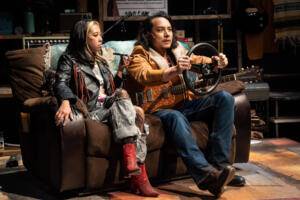
Aurora Adachi-Winter and Artistic Associate Matthew C. Yee (as Lucy and Charlie). Photo by Liz Lauren.
Susanna: Do you think theater is more limiting than movies in a sense?
Matthew: It’s limiting because you can only work with the space that you’re in. You can only work with the design elements that you have and the limited actors that you have. In our show, we have nine actors and we have some of them that are playing multiple characters. We have a limited budget, so we double-cast those roles. But you do it in a way that supports the show rather than deprives it. So, you know, the budget for a movie if you’re going to produce a movie is like millions and millions of dollars, right? And you’re able to force the perspective that the viewer has on certain moments. But in theater you can only light things a certain way and you can have people on stage or you can have people off stage. So to embrace that and ignore that, I want my theater to have all of the elements exposed. You probably notice when some of us aren’t in the scene, we’re just sitting on the stage up in the back. Like tuning our instruments or watching the scene and enjoying it. That experience of theater being a communal thing extends to the actors as well. It’s limiting, but it’s also freeing. Film–you do it, you film it, you make it, it’s done. The actors are no longer involved. But with theatre, the experience is ongoing for everybody. It grows and changes and continually evolves in that way. So yes, there are limitations, but there are also some great advantages.
Susanna: I heard that in the second part of the play, the audience really starts to open up. So was an intermission a conscious choice or did the show just happen to be that long?
Matthew: You want to be able to get all of your story right, in a certain amount of time, but you also need to like, let people use the bathroom and refill their drink. The great thing about an intermission is you can reset, you can sort of let that first act be the energy and the moment that it is, and then you give them a little break and then you come back really, really strong with something really, really fun. And we have that, that song at the top act, the two that I really love. So we get to reestablish that we are a community of actors that are telling you a story together and then we take off again and people feel, you know, refreshed and ready to embrace another hour of performance.
For Part II of the interview, click here.
This post was written by the author in their personal capacity.The opinions expressed in this article are the author’s own and do not reflect the view of The Theatre Times, their staff or collaborators.
This post was written by Susanna Sun.
The views expressed here belong to the author and do not necessarily reflect our views and opinions.

